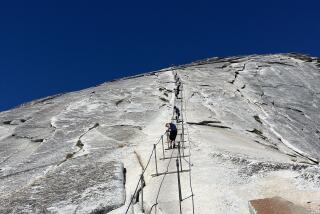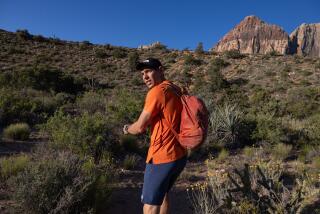He’s Not About to Take the Sport for Granite : Schweizer’s Rocky Road to the Top
- Share via
To Paul Schweizer, free-climbing the face of a 1,000-foot-high rock has little to do with an intrinsic wilderness experience.
Once atop a massive wall, Schweizer does not consider himself one with nature. He does not confer with the cosmos or believe himself to have conquered the impossible.
Most often, Schweizer commemorates the climb by scrambling down the rock’s gentler back side, having a lunch of brown rice or a cold baked potato, then driving his van to the next climb down the road.
“Lots of people think rock climbing is this idealistic, wilderness thing,” said Schweizer, considered to be one of Southern California’s expert climbers. “And that rock climbers are all wilderness purists, that they commune spiritually with nature or something. But most don’t even backpack. They car-camp or stay in motels at night, then, if they can, they’ll drive right up to the rock the next day.”
Schweizer, 31, of Irvine, prefers free or crag climbing, in which his hands, feet and body are used to pull himself up and along the cracks and crevices of very large, steep rocks. A rope, harnessed to his waist, is used, but only to catch him should he fall.
It’s not, as some believe, simply a battle between brute strength and steep stones.
Moves among the rocky nooks and crannies must be orchestrated in an exact sequence. Many times the difference between climbing or falling lies in the correct twist of a thumb or the angle of an elbow.
“Rock climbing is gymnastics,” Schweizer said. “Only the rock is the medium, and the sequence of moves you carry out is up in the air. You can’t just muscle up there. Some routes require many attempts before you master all the problems.”
“Existential Decay” is one such route. Located in Joshua Tree National Monument, Existential Decay was named but has yet to be tamed by Schweizer and his climbing partner, Randy Levitt of Del Mar.
The entire route is a little more than 50 feet, a short jaunt compared to many of the 1,000-foot (or more) climbs the two have mastered together. But in free climbing, length seldom indicates difficulty.
“One try (on Existential Decay) takes about five minutes,” Levitt said. “But after about three tries, you don’t have enough strength or stamina to try it again the same weekend. So it might take us three more years of weekends to finally get it.”
The wait doesn’t seem to bother Schweizer. To him, most routes once mastered aren’t worth doing a second time. First-ascent climbing is his preference.
“I don’t climb just because it’s there,” he said, then chose his words carefully: “I climb to develop an exercise in complicated skills.”
Schweizer’s theoretical base may come from his background. He’s working on a doctoral dissertation in mathematical logic at UC Irvine.
“It’s a very creative thing,” Schweizer said of rock climbing. “You have to figure out a sequence (of moves) that will work, and once you do, it’s like you’ve created something. (Upon finishing the climb) you look at the rock, see the chalk marks you’ve made, and you see the whole evolved process in front of you.”
Besides working on the mental aspects of rock climbing, Schweizer lifts weights at UCI. He does bar dips and pull-ups and hangs off a small wood box to strengthen his hands and fingers.
He also walks on a slack line--a 10-foot-long metal chain strung across two points about two feet off the ground in the weight room. Walking across tightrope-style develops coordination and balance--two necessities when climbing at odd angles.
Sometimes, training can be more perilous than the climb. Last week, Schweizer fell off the slack line and crashed to the floor, suffering a hairline fracture in his right arm. He said he would climb this weekend, however. After eight years of serious climbing, it was his first climbing-related injury.
Schweizer is frequently asked whether he has a death wish.
“People that ask that really don’t know what they’re saying,” Schweizer said. “If I had a death wish, it’s obvious I’ve had plenty of opportunities to carry it out.”
More to Read
Sign up for The Wild
We’ll help you find the best places to hike, bike and run, as well as the perfect silent spots for meditation and yoga.
You may occasionally receive promotional content from the Los Angeles Times.






